Like many successful businesses and websites, the web is a limitless opportunity for a successful career, especially in ecommerce.
Pricing, website hosting, software-as-a-solution (SaaS) or Open Source models... Do you want to get started in ecommerce but aren’t sure which route to take? To begin your adventure, you’ll need to choose the best ecommerce platform for a small business to host your online store.
An ecommerce platform provides you with a full range of services for launching, managing and monitoring your ecommerce site.
But beware: all solutions are comparable, but not identical. Choosing the right software is essential in ecommerce for a successful site.
Depending on the size of your business, your needs and your skills, not all platforms will meet all your expectations... Except one in this article, tailored to your needs, that’s sure to tick all the boxes on your list!
What is an ecommerce platform? But above all, what is a good ecommerce platform? What do you need to consider before choosing the right ecommerce platform for your online store?
In this article, we’ll explain everything you need to know to help you select your content management system (CMS) and make your ecommerce adventure a success, like these companies whose success creates vocations like yours!
What are the 12 best ecommerce platforms for selling online?
Let’s take a look at a comparison of ecommerce solutions, platform by platform!
1. WiziShop
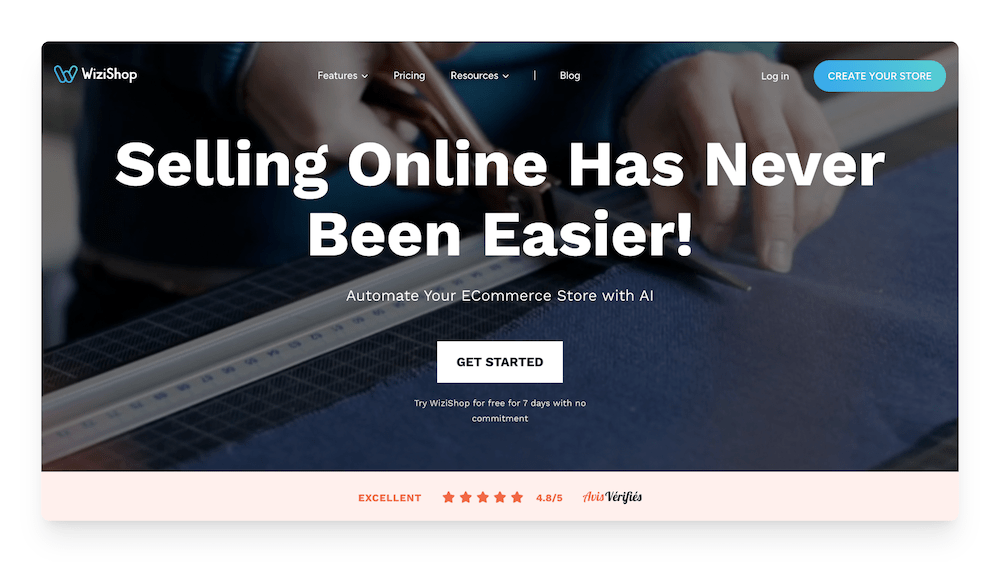
For over 16 years, the ecommerce platform has been constantly listening to its customers and adapting to all the requirements of the ecommerce market in real time. Though based in France, WiziShop is available internationally.
Technical maintenance, personalized support, exceptional partnerships with the best experts to help entrepreneurs, etc.: this software is a trailblazer in the rankings of the best ecommerce structures in France and abroad.
- Making ecommerce accessible to all
Since 2008, the company’s ambition has been to make ecommerce accessible to all. Aware of the complex challenges of doing business on the internet, the platform’s years of experience have enabled it to specialize in the management of an essential ecommerce tool for all online entrepreneurs, enabling it to cater for all online seller profiles.
- Creating an online store step by step
Don’t know where to start with ecommerce? Don’t worry, as the best ecommerce website builder guides you through the creation of your online store step by step!
WiziShop is a simple, intuitive online platform that lets you create your own online store without any technical knowledge. Just follow the simple steps to launch your online store in no time.
In short, it’s easy to start selling!
Step 1 - Sign up in a few clicks
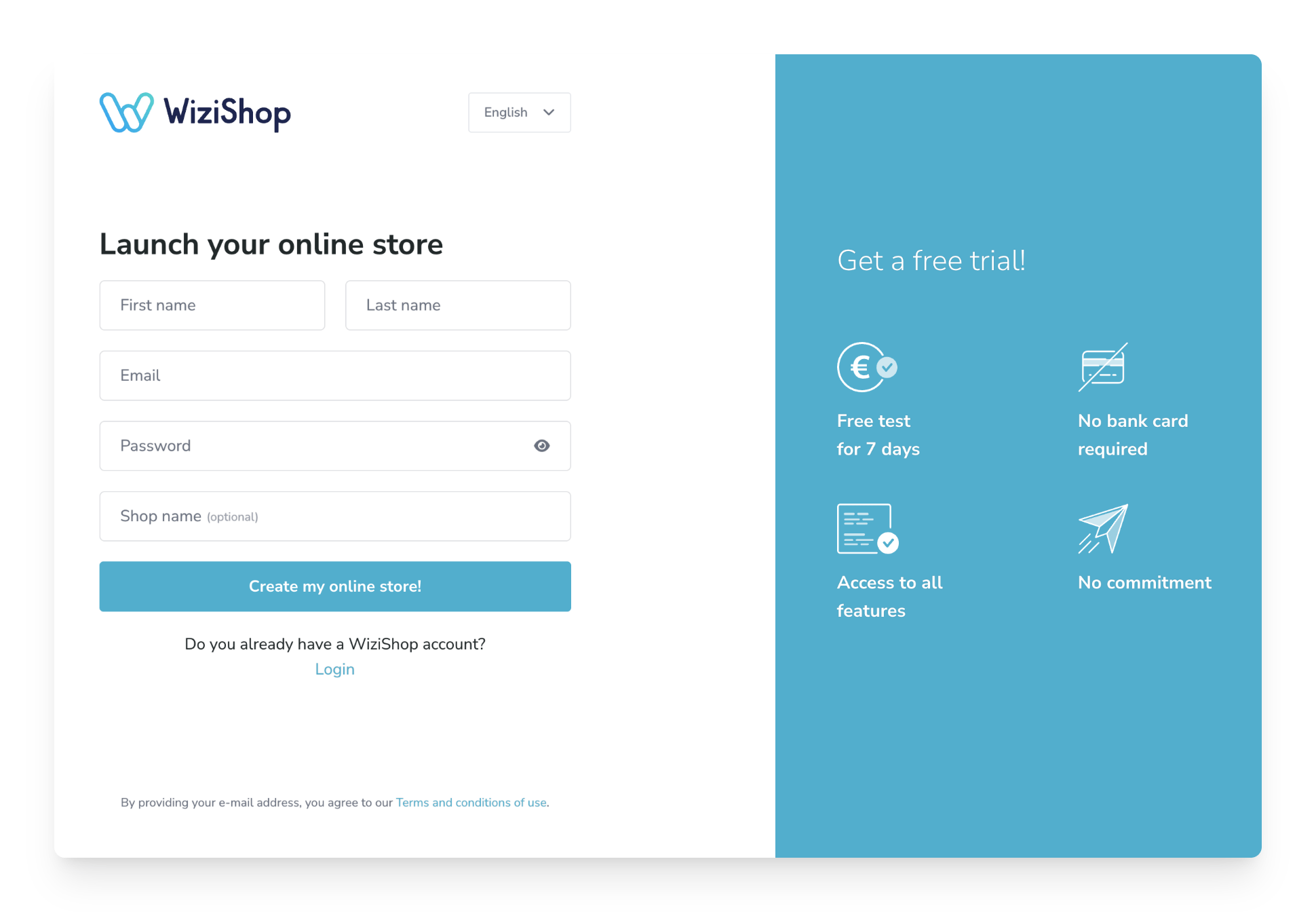
Step 2 - Follow the first steps
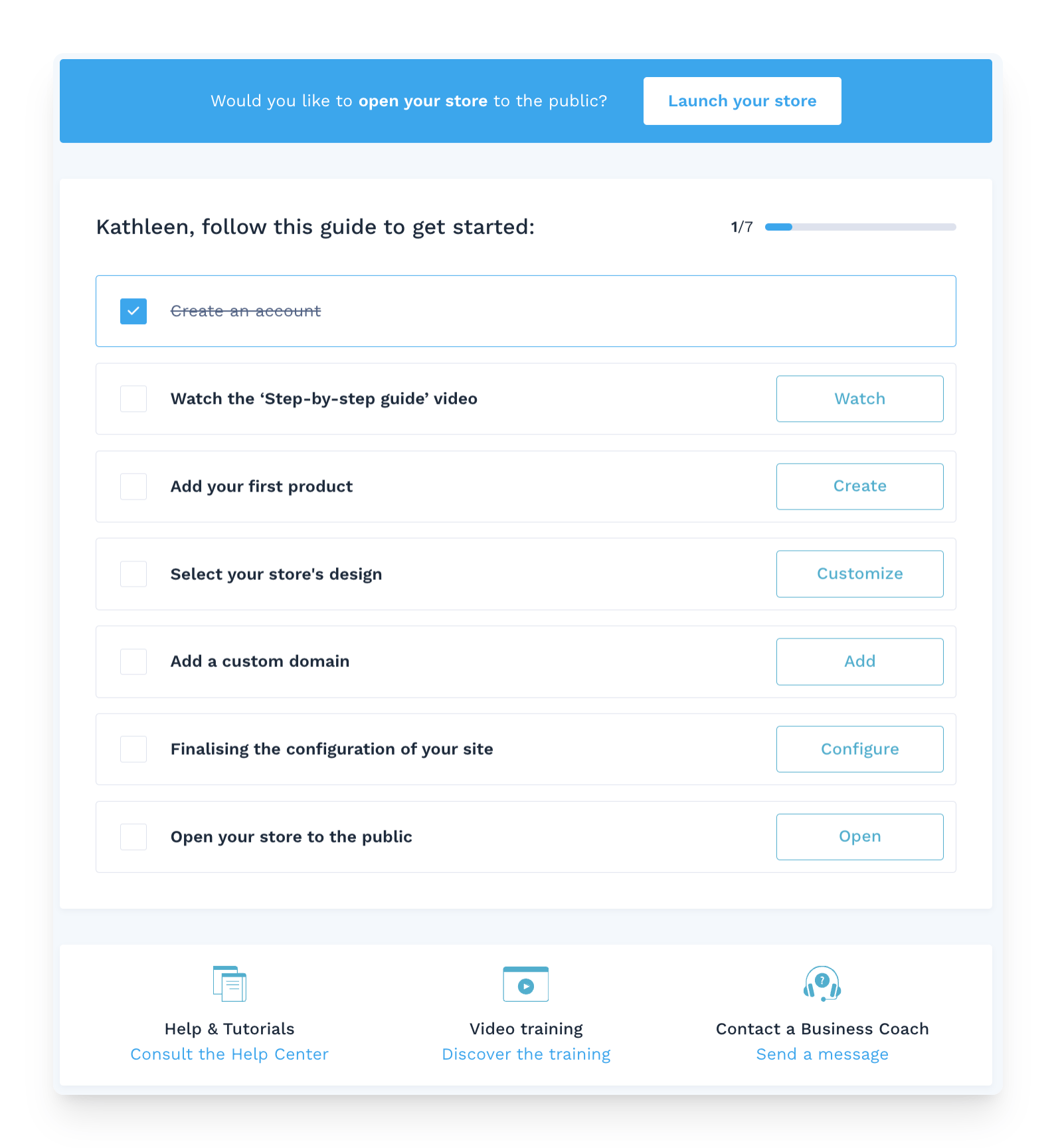
Step 3 - Add your first product
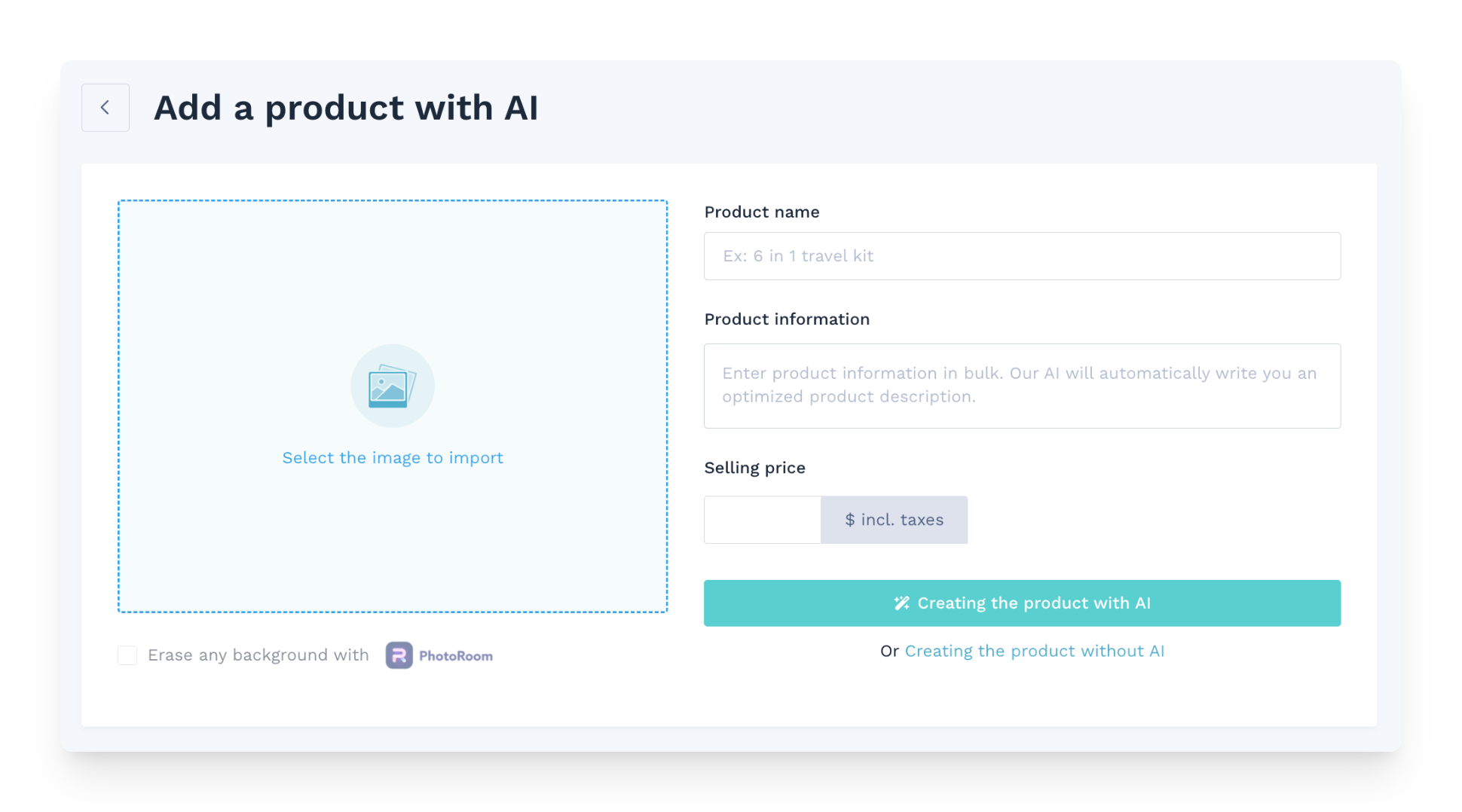
Step 4 - Find your domain name using AI
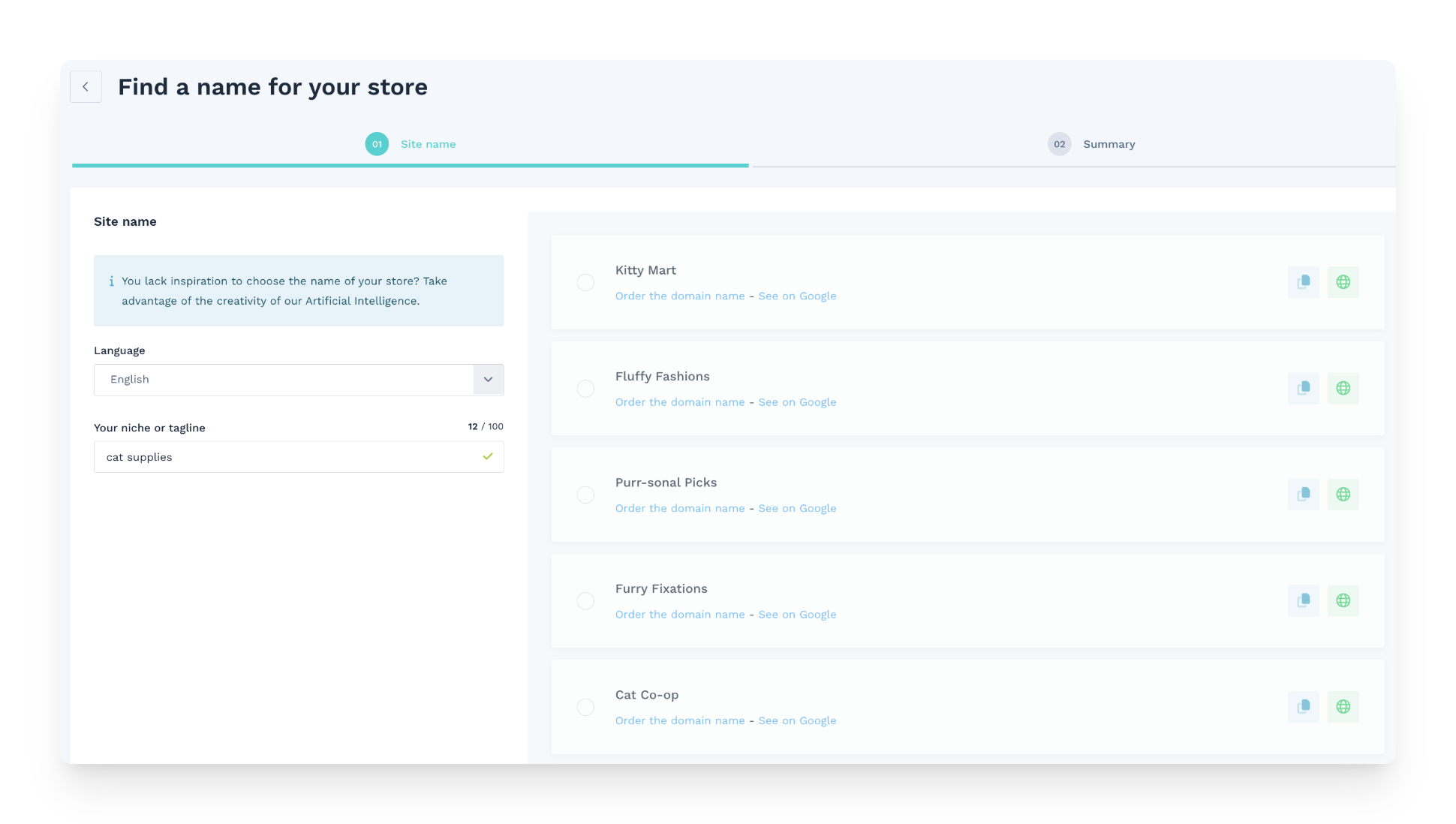
Step 5 - Set up your store
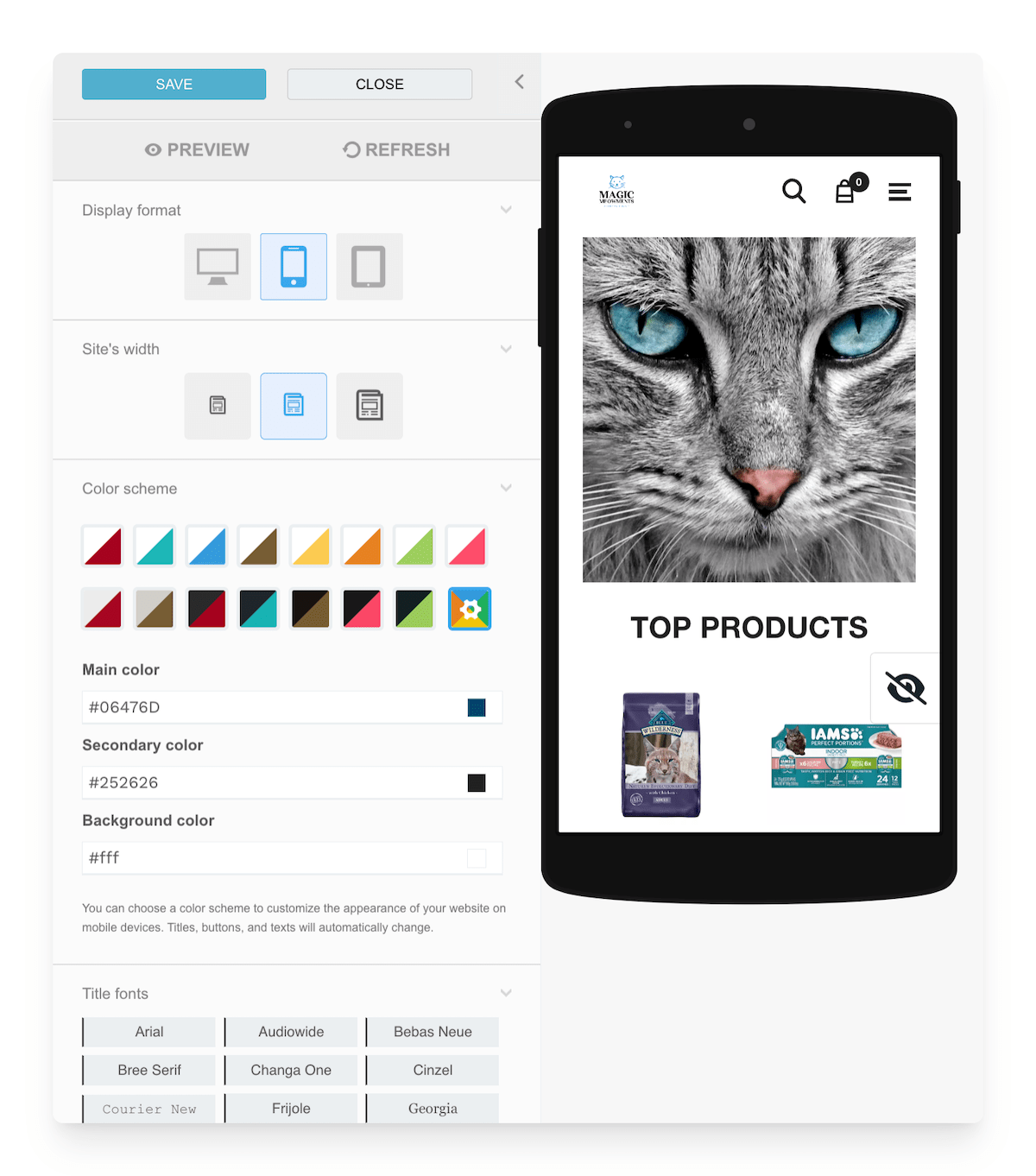
Step 6 - Develop your brand with the help of your Business Coaches at your side
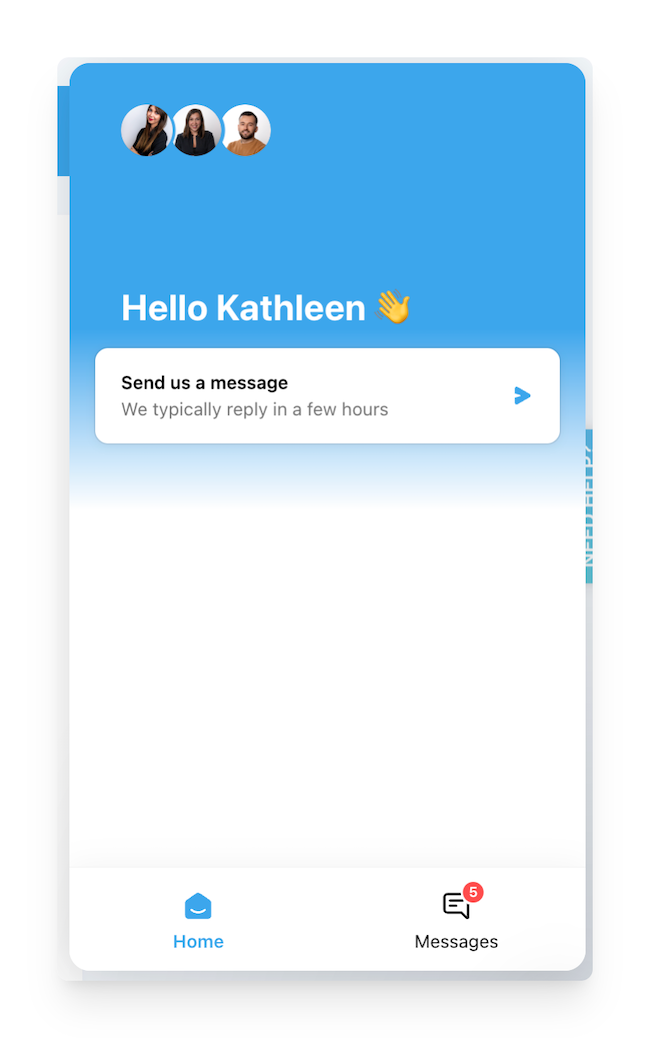
- Personalized support
Have you heard of our Business Coaches? They’re the team of experts who will support you throughout the life of your online sales business.
Whenever you have questions about a feature, a tool, or an option, or you need advice on how to improve your actions.
Improve your conversion rate, find out how to perform an ecommerce audit to boost your sales, take advantage of all the benefits of your solution... Our Business Coaches are happy to help.
- Complimentary ecommerce training
Have you been dreaming of a step-by-step, themed video training course that you can watch over and over again, so you can launch your business with peace of mind?
With your subscription, you’ll benefit from a wide range of resources covering everything you need to know: hosting, managing your web catalog, customizing themes for your design, SEO optimizations, the first steps on your online store... It’s all here!
- Integration of artificial intelligence for content writing
Writing product descriptions is a time-consuming activity and can quickly become repetitive, but thanks to WiziShop’s AI, available with all subscription plans, you can now concentrate on other important tasks.
The AI takes care of everything for you, from writing your product descriptions to formatting your listings. You’ll be able to publish product pages in no time at all, naturally boosting your chances of conversion.
Even your communication strategy can be supported by AI: your blog posts, FAQs, category pages, and the pitches for your future videos and ads for social networks can be blown away by WiziShop’s unlimited artificial intelligence, a handy ecommerce resource no matter what you sell.
- A service optimized for SEO
WiziShop has made SEO a top priority: we know how difficult it is to stand out when it comes to creating an online sales site. With this CMS, you’re opting for a platform that’s already highly regarded by Google, and on which you’ll benefit from a technically sound base for reaching the first pages of search results.
- Over 400 features
Websites created with WiziShop are high-performance, mobile-friendly sales sites, optimized for all technical aspects of the web.
Of course, your software is accessible on any device: you don’t need to save your progress internally, and you can work from any workstation. Use your tools on the move!
Your journey with WiziShop doesn’t end there: the solution has a good understanding of the daily lives of digital commerce entrepreneurs and takes care of optimizing them. Automatic sending of invoices, cross-selling levers, abandoned-cart reminders, setting up promotional codes... We've thought of everything to make the day-to-day running of your business as smooth as possible!
Various subscription plans are available, but regardless of your chosen plan, you’ll be able to take advantage of a 7-day free trial to see for yourself the benefits of using WiziShop for your website.
WiziShop pricing: Starting at $24.90 per month
| Pros 🌟 | Cons 🚧 |
|---|---|
| 🌍 Accessibility for everyone, even without technical knowledge | 🎓 Limits of online training for certain users |
| 🎓 Personalized support with Business Coaches | 🌀 Limited number of themes but ultra customizable |
| 🛠 Simplified store creation with a step-by-step process | 🛠 Limits linked to SaaS mode |
| 🤖 Integration of AI to automate repetitive tasks | - |
| 🔍 Integrated SEO optimization for better SEO | - |
| 📱 Flexible and portable use on any device | - |
| 🛒 More than 400 features to optimize store management | - |
Try WiziShop free for 7 days
THE EASIEST NO-CODE ECOMMERCE SOLUTION✅ No credit card required
✅ Access to all features
✅ No commitment
2. Shopify
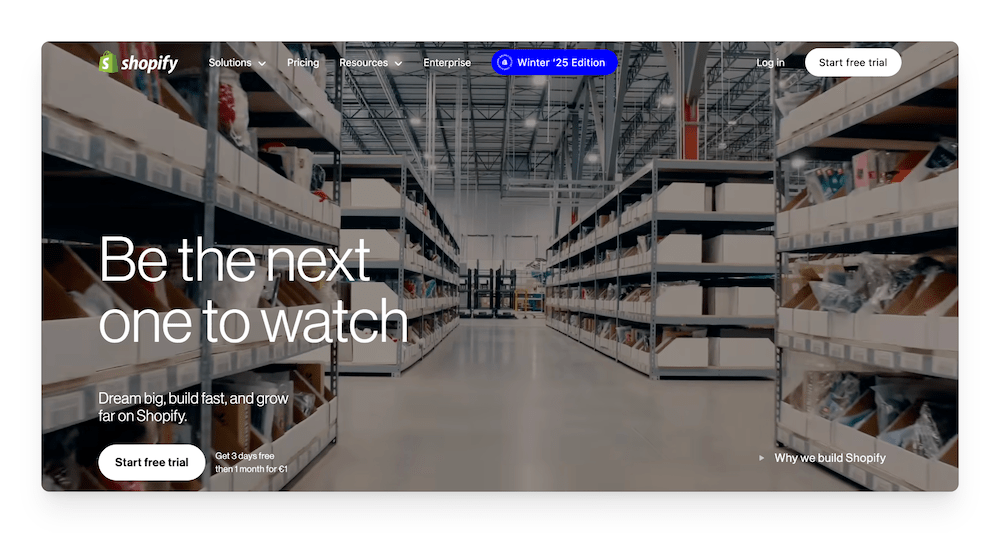
Shopify is an ecommerce solution founded in 2006. The platform has become a major ecommerce player. Shopify is one of the historic SaaS solutions on the online sales market.
- Comprehensive ecommerce functionality
Shopify offers a range of features that make it easy to set up a professional online store. You can choose from hundreds of themes, all customizable to best match your corporate identity. Product, payment, and shipping management are centralized in a dashboard.
What’s more, Shopify offers an API and an App Store rich in applications that let you add extra functionality, although the majority of these applications are chargeable.
- A turnkey solution
Even without technical skills, you can create a professional website in just a few simple steps. What’s more, the software is hosted, which means that any site maintenance or updates are handled by in-house developers. Shopify is also mobile-friendly for an optimal user experience on all devices.
- 24/7 support for retailers
Whether by chat, email or phone, you can get help at any time. The Shopify Help Center is also a comprehensive resource with detailed guides and also a user forum rich in tips and case studies.
- Shopify Plus: for larger businesses
For businesses with more complex needs, Shopify offers Shopify Plus, a customized solution with dedicated support and advanced features like multi-shop management and advanced API integrations.
Shopify pricing: Starting at $29 per month
| Pros 🌟 | Cons 🚧 |
|---|---|
| 🛠 Complete and customizable ecommerce features | 💸 Additional apps often paid |
| 🚀 Turnkey solution, easy to use even without technical skills | 💻 Dependance on the Shopify ecosystem for advanced features |
| 📱 Mobile-friendly software for optimal user experience | 🔧 High cost of Shopify Plus for advanced features |
| 📞 24/7 support with assistance via chat, email, and telephone | - |
| 🏢 Shopify Plus for large businesses with complex needs | - |
3. WooCommerce (for WordPress users)
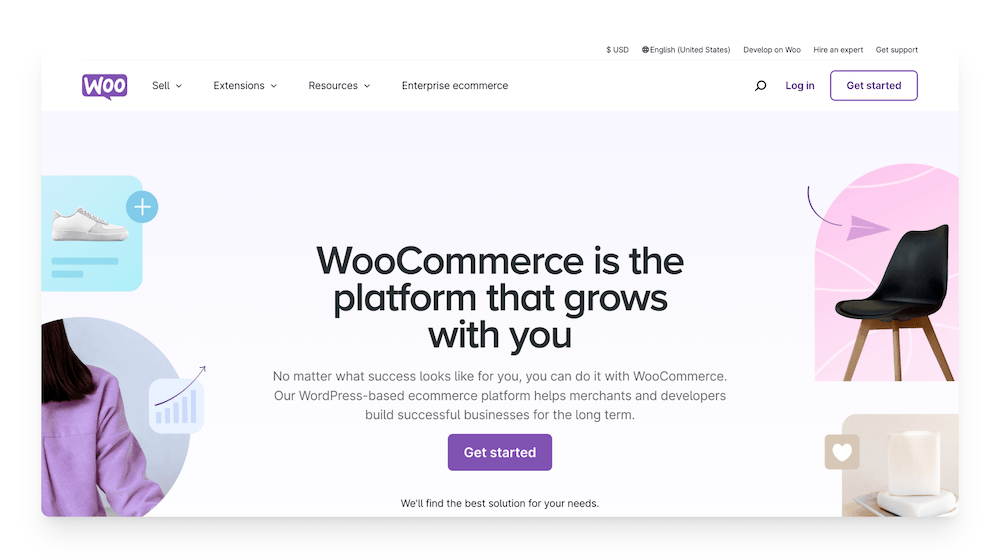
WooCommerce is an open-source ecommerce platform designed for WordPress. Flexible and customizable, WooCommerce is one of the most popular solutions for those looking to sell online and who have technical skills in coding.
- A flexible solution
Whatever the nature of your products, whether physical items, digital items or customized services, WooCommerce lets you sell them on your WordPress site.
WooCommerce gives you access to a wide range of extensions that let you add extra functionality, such as subscriptions or reservations.
- A solution for greater freedom
Since the WooCommerce solution is open source, i.e., free and infinitely customizable by processing your site’s code, WooCommerce gives you total freedom over your store. No subscription required, provided you know how to code or you can outsource the design of your WooCommerce store to a specialized agency.
WooCommerce pricing: Free for the base plugin but will need to invest in paid extensions
| Pros 🌟 | Cons 🚧 |
|---|---|
| ⚙️ Flexible solution suitable for the sale of physical goods, digital products, and services | 👨💻 Requires technical coding skills for advanced customization |
| 🛠 Access to a huge range of extensions to add functionality | 💼 Possibility of having to subcontract to a specialized agency if you haven’t mastered coding |
| 🌍 Open source, offering complete freedom to customize the store | ⏳ Technical management and maintenance at the user’s expense |
| 💸 No subscription required, potentially lower initial cost | - |
4. Adobe Commerce (Magento)
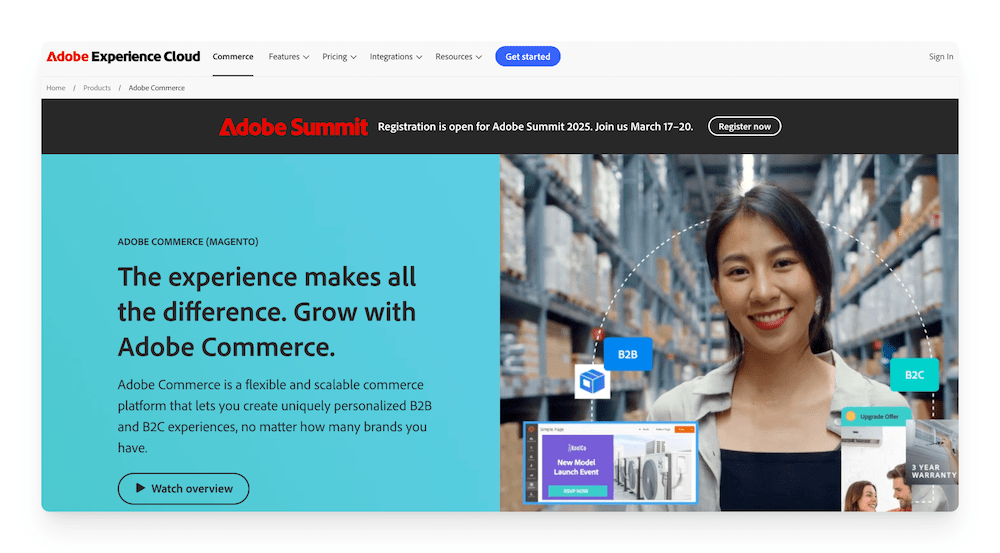
Adobe Commerce, formerly known as Magento, is an ecommerce platform designed to deliver a personalized, scalable online sales experience, whether you’re running B2B or B2C stores.
- International management
With Adobe Commerce, you can monitor and localize your websites by brand, catalog, country, and currency. The platform allows you to rapidly deploy multiple storefronts, while offering payment options adapted to a global clientele.
- Adobe integrations
Adobe Commerce facilitates the development of customized solutions thanks to its flexible platform architecture. Integration with Adobe tools enhances native functionality and reduces operational costs.
- Marketplace and extensions
Customize every aspect of your online store with the many applications and extensions available in Adobe’s Commerce Marketplace. Whether it’s back-office integrations, order management, or marketing solutions, you’ll find interesting options to enhance the customer experience.
Adobe Commerce pricing: On request
| Pros 🌟 | Cons 🚧 |
|---|---|
| 🌍 International management with localization by brand, catalog, country, and currency | 💰 High cost of the solution, especially for small businesses |
| 🛠 Seamless integration with Adobe tools for enhanced functionality | 🔧 Complexity and need for technical expertise |
| 🎨 Flexibility and customization thanks to the open architecture of the platform | ⏳ Potentially long deployment and management times |
| 🛒 Wide choice of applications and extensions via Adobe’s Commerce Marketplace | 📈 Complexity with managing multiple extensions and integrations |
5. BigCommerce
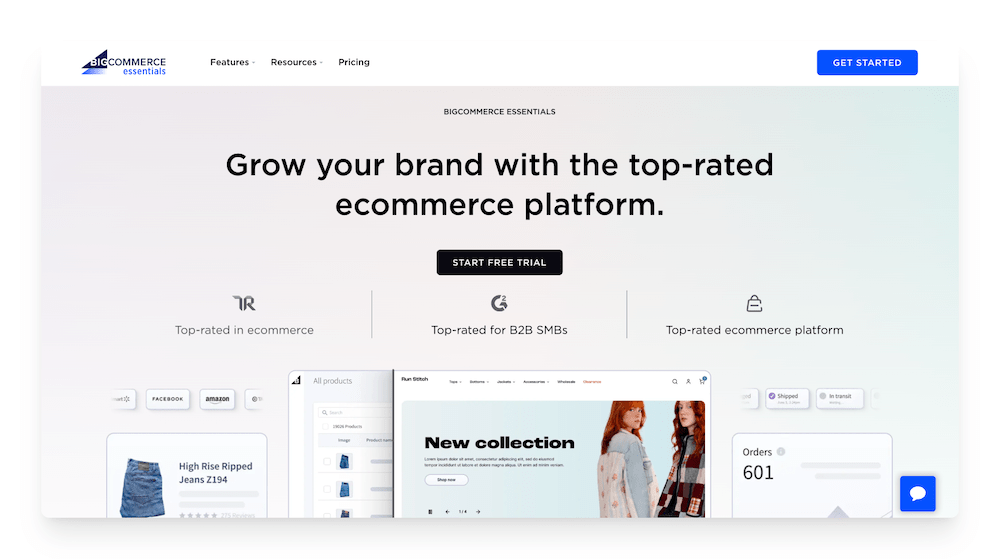
BigCommerce is a comprehensive ecommerce solution offering the flexibility to create effective online experiences tailored to your needs. Whether you’re a small business or a major brand, this platform can help you grow your business.
- Store design made easy
BigCommerce makes it easy to create and customize your online store. You can quickly launch and modify your site’s pages with drag-and-drop functionality, without the need for coding skills. For those who wish to go further, the BigCommerce software offers theme customization with access to HTML, CSS, and JavaScript codes.
- Optimized conversion
The platform is optimized for fast loading speeds. BigCommerce supports numerous digital wallets to facilitate payments, as well as integrated SEO features to attract more traffic.
- Multi-channel commerce
With BigCommerce, you can run multiple storefronts and sell on various platforms from a single dashboard. Whether you sell on marketplaces like Amazon and eBay or directly via social networks, BigCommerce centralizes your operations.
- B2B functions
BigCommerce is tailored to the needs of B2B businesses, with tools for managing customer groups, customizing price lists, and managing purchase orders.
BigCommerce pricing: Starting at $29 per month.
| Pros 🌟 | Cons 🚧 |
|---|---|
| 🛠 Simplified store design with drag-and-drop and code customization | 💻 Technical skills required for advanced customization |
| ⚡ Optimized conversion thanks to fast loading speed and SEO features | 💰 Potentially high cost for advanced features and third-party apps |
| 🌐 Centralized multi-channel commerce to sell on multiple platforms | 🔧 Complex operations management |
| 🏢 B2B functionalities adapted for customer and order management | - |
6. PrestaShop
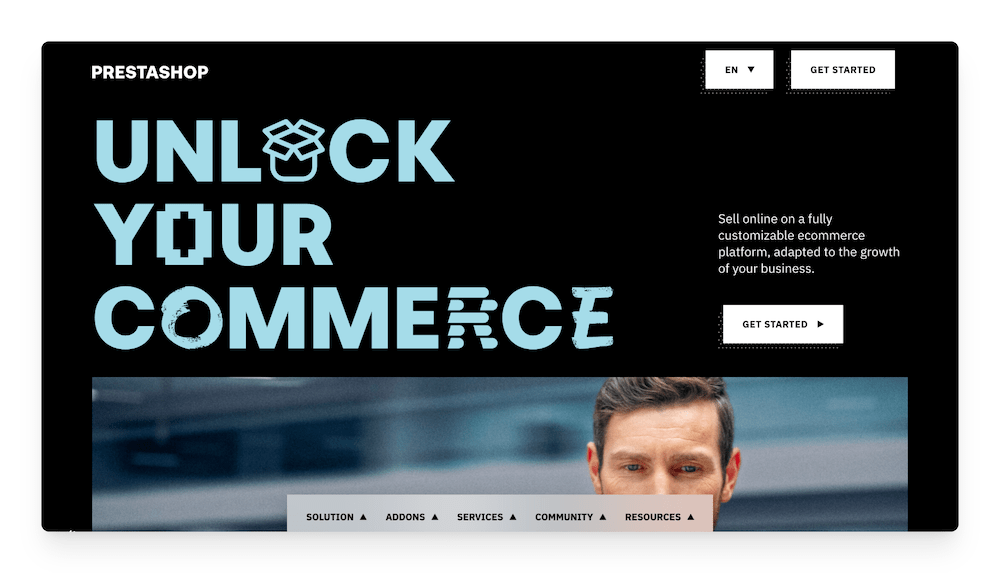
PrestaShop is a flexible, open-source ecommerce platform designed to enable businesses of all sizes to efficiently create, customize, and run their online store. Whether you’re a small start-up or a large enterprise, PrestaShop offers solutions tailored to your needs to maximize your online presence and grow your business.
- Customization and flexibility
Choose from a wide range of fully customizable themes optimized for mobile devices. Easily add and manage your products, set up variations (such as sizes and colors), and customize your site’s pages.
- Complementary modules
PrestaShop offers a marketplace of modules to add extra functionality to your store. Regardless of it’s to improve your SEO, integrate customer reviews, or automate your marketing actions, you can expand your site in this way.
- Additional sales channels
PrestaShop lets you sell your products on a variety of platforms, including marketplaces like Amazon and Google Shopping, as well as social networks like Facebook and Instagram. With the help of external modules, you can synchronize your catalog with these platforms.
PrestaShop pricing: free for basic version, starting at €24 (approximately $24.75) for version with hosting, support, and ecommerce features
| Pros 🌟 | Cons 🚧 |
|---|---|
| 🎨 Customization and flexibility with a wide range of modular themes | 💻 Requires technical skills for in-depth customization |
| 🛠 Module marketplace to add additional features | 💸 Some modules may be expensive and increase overall fees |
| 🌐 Ability to sell on multiple channels, including marketplaces and social networks | 🔧 Integration management can be complex |
| 🌍 Open-source platform offering complete freedom to customize the store | ⏳ Technical management and maintenance at the user’s expense |
7. Squarespace
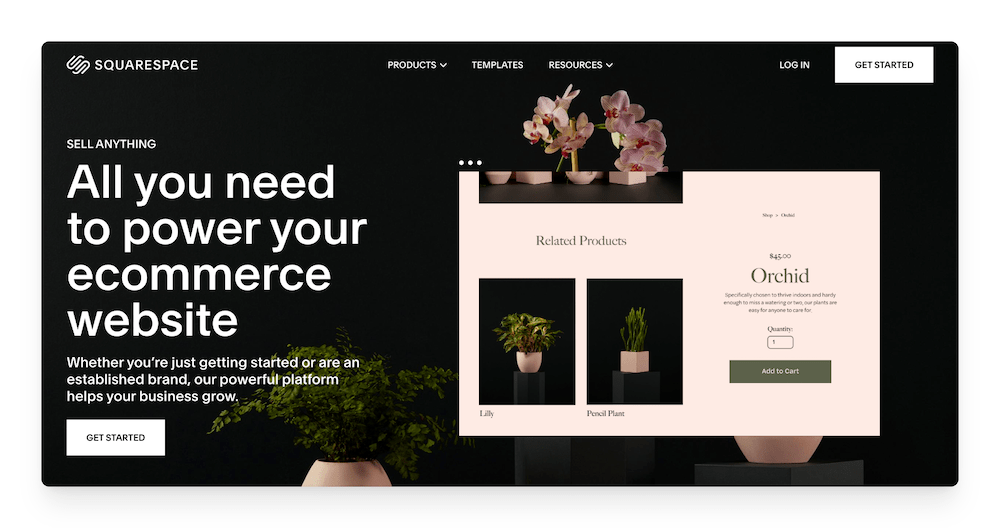
Designed for designers, entrepreneurs, and professionals, Squarespace gives you the tools you need to design a site that stands out and reflects your unique style.
- Numerous designs
When it comes to design, you can choose from a selection of customizable templates created by leading designers. Whether you need a website to showcase your products, services, or portfolio, Squarespace offers options to suit every industry. Customize every detail so that your site matches your vision and business needs exactly.
- For creative content
Show your work at its best with Squarespace’s professional portfolio designs. Use customizable galleries to showcase your projects, and create password-protected pages to share confidential content with your customers.
- Mobile management
With Squarespace’s mobile application, you can run and update your website from your smartphone. Publish blog posts, add images, edit pages, and receive support from the Squarespace team directly from your mobile device, whether iOS or Android.
Squarespace pricing: Starting at $16 per month.
| Pros 🌟 | Cons 🚧 |
|---|---|
| 🎨 Selection of customizable templates created by renowned designers | 🚀 Limited scalability for large ecommerce operations |
| 🖼️ Specialized tools for creators, especially for portfolios and galleries | 🔧 Limited customization in terms of technical flexibility and code access |
| 📱 Easy managing and updating of the site via the mobile application | 🌐 Less robust ecommerce options compared to platforms dedicated to online commerce |
| 🔒 Ability to create password-protected pages for confidential content | - |
8. Wix eCommerce
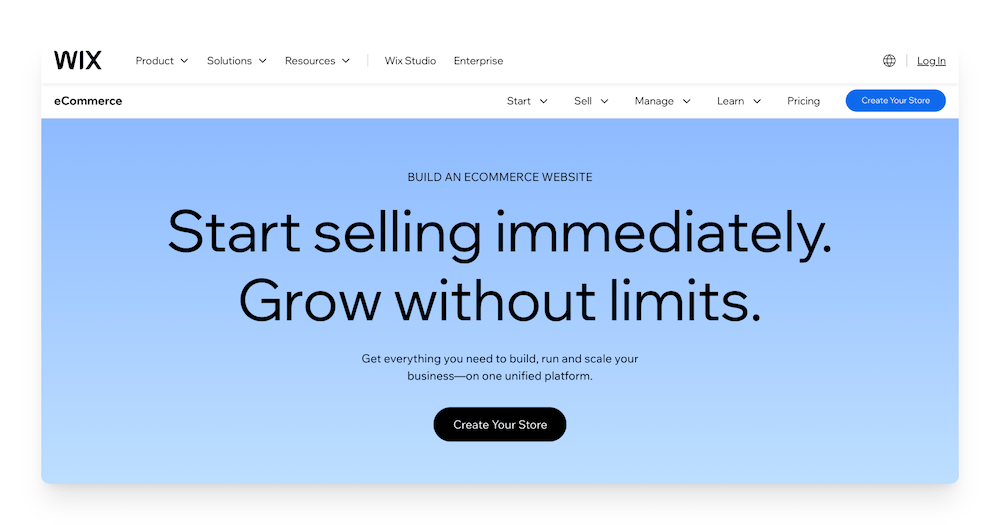
Wix is a website creation platform that lets you create a professional online store through its turnkey infrastructure. With Wix, you can build an ecommerce site from your showcase site and manage your online store.
- The Wix ecommerce tool
You can choose from over 500 templates, customize your site’s design, add products, set up payment and delivery options, and start selling online in just a few steps as a Wix user.
- Reliable infrastructure
Wix guarantees an optimal user experience thanks to a robust infrastructure designed to handle traffic peaks and ensure fast loading times. Your site is secured with advanced security protocols that ensure your customers’ data and transactions are protected. From showcase site interface to ecommerce, Wix is one of the solutions that can meet the needs of entrepreneurs just starting out.
- Customization and print on demand
Wix allows you to customize your products with the print-on-demand option, and expand your offering without having to handle inventory. You can also use dropshipping via this customization tool to outsource production and shipping.
Wix eCommerce pricing: Starting at $29 per month.
| Pros 🌟 | Cons 🚧 |
|---|---|
| 🎨 More than 500 customizable templates to create a unique ecommerce site | 🔧 Limited code-level customization for advanced users |
| 💻 Reliable infrastructure with advanced security protocols for optimal user experience | 💰 Possible additional costs to access certain premium features |
| 📦 Print-on-demand and dropshipping integration to expand the offer without inventory management | 🌐 Less advanced SEO and ecommerce options compared to specialized platforms |
| 🚀 Ease of use for beginners with turnkey infrastructure | - |
9. Salesforce Commerce Cloud
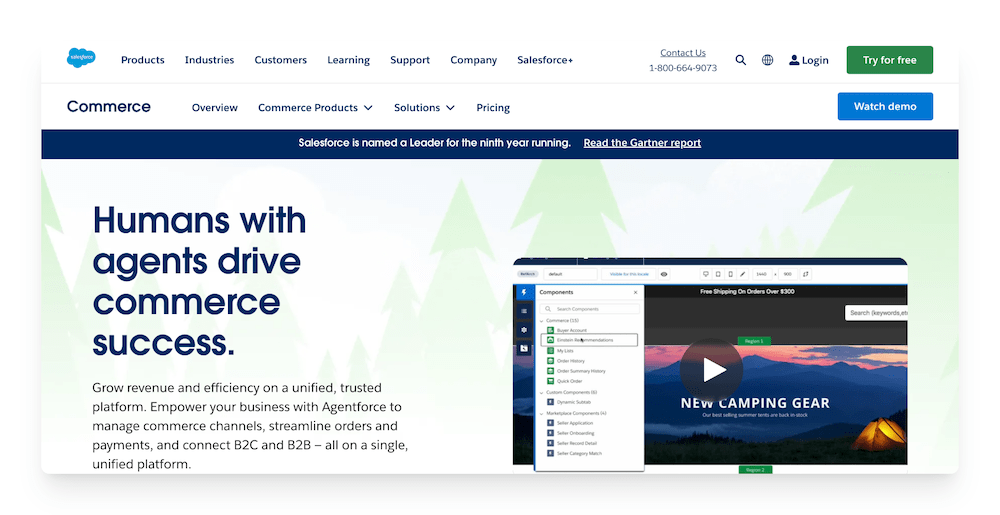
Salesforce Commerce Cloud, previously known as Demandware, is a leading ecommerce platform designed to help businesses deliver personalized and seamless shopping experiences across all channels. Powered by AI and cloud-based technology, it supports both B2C and B2B commerce, enabling brands to scale globally.
- Unified commerce
Salesforce Commerce Cloud unifies your online and offline operations, providing a consistent customer experience across all touchpoints. From physical stores to digital platforms and mobile apps, this integration ensures that customers encounter a seamless journey no matter where they shop.
- AI-powered personalization
Leveraging Salesforce’s Einstein AI, the platform enables real-time personalization. By analyzing customer data and behavior, it can deliver tailored product recommendations, dynamic pricing, and content, enhancing shopper engagement and boosting conversions.
- Scalability and global reach
Built on a robust cloud infrastructure, Salesforce Commerce Cloud supports businesses as they grow, whether that’s adding new product lines or expanding to new regions. Its multi-language, multi-currency, and global tax support make it ideal for brands with international ambitions.
Salesforce Commerce Cloud pricing: Starting at 1% gross merchandise value
| Pros 🌟 | Cons 🚧 |
|---|---|
| 🧠 Advanced analytics and AI-powered tools for personalization | 💰 Premium pricing, which may be prohibitive for smaller businesses |
| 🌍 Multi-currency and multi-language capabilities for international growth | 📚 Complexity in setup and management, requiring skilled users or additional training |
| 🔗 Seamless integration with other Salesforce products for CRM, marketing, and service | 🔌 Heavy dependence on external apps and developers for certain functionalities |
| 📱 Responsive and mobile-friendly interfaces to meet modern shopping demands | ⏳ Advanced customizations can be time-intensive to implement |
10. Big Cartel
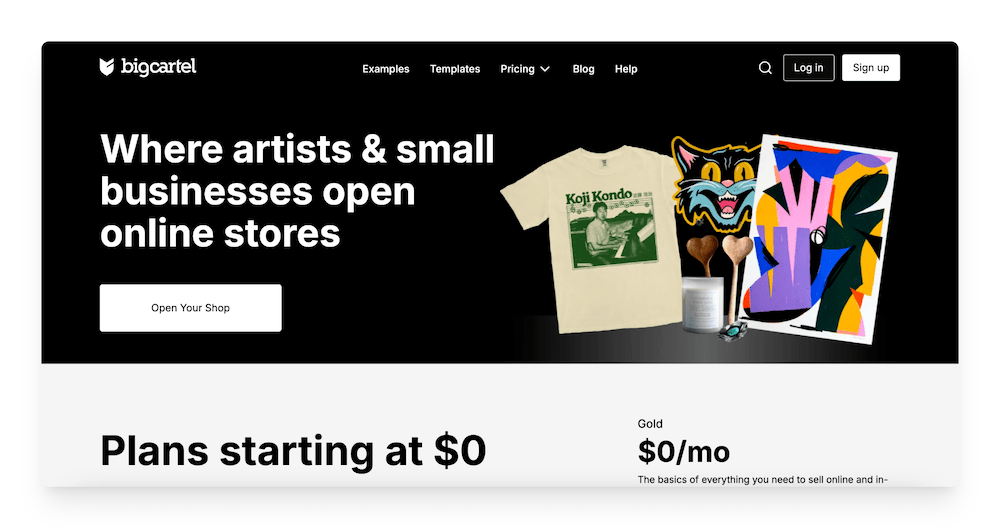
Big Cartel is a simple yet effective ecommerce platform tailored for independent artists, makers, and small businesses. With its user-friendly design and low-cost plans, it’s ideal for creatives looking to sell their work online.
- Simplicity and ease of use
Big Cartel is designed for users without technical expertise. Its intuitive interface allows you to set up an online store quickly and easily. You can customize your store’s look, add products, and start selling without needing coding knowledge.
- Affordability
With free and low-cost paid plans, Big Cartel is a budget-friendly option for small businesses and individual creators. The platform offers essential features to launch and run a store without breaking the bank, making it accessible to entrepreneurs at any stage.
- Creative freedom
Big Cartel caters to the needs of artists and creators by offering customizable themes and design options. You can showcase your work in a way that aligns with your brand, helping you stand out in a competitive market.
Big Cartel pricing: Free plan available / paid plans start at $12 per month
| Pros 🌟 | Cons 🚧 |
|---|---|
| 🏦 Free and budget-friendly pricing options for small businesses | 📦 Best for small-scale operations; not great for large or fast-growing businesses |
| 💡 Customizable themes tailored for artists and creators | ⚙️ Lacks advanced ecommerce functionality like multi-channel integration or in-depth analytics |
| 🛠️ Straightforward tools for launching and managing your store without technical skills | 🧩 Limited number of third-party apps compared to larger platforms |
| 📱 Store management on the go with a dedicated mobile app | 🔍 Advanced customizations may require coding knowledge |
11. Volusion
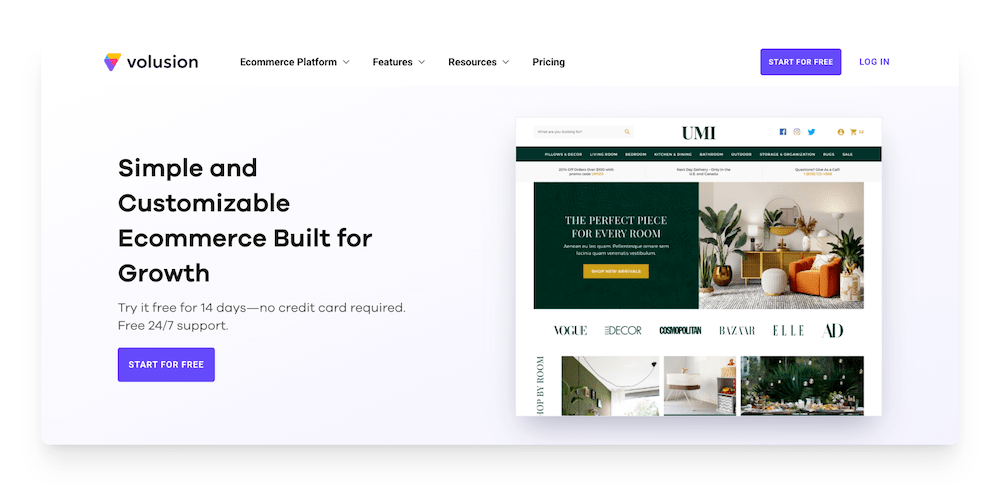
Volusion is a versatile ecommerce platform designed for small to medium-sized businesses seeking a feature-rich solution for selling online. With its intuitive tools and integrated analytics, Volusion helps merchants create, manage, and grow their online stores efficiently.
- All-in-one platform
Volusion offers a comprehensive suite of tools to run your online business, including website building, inventory management, payment processing, and marketing features. This all-in-one solution eliminates the need for multiple subscriptions or third-party integrations, streamlining your operations.
- Built-in analytics
With Volusion’s robust analytics tools, you can gain valuable insights into your store’s performance. The platform tracks key metrics such as sales, customer behavior, and website traffic, helping you make data-driven decisions to optimize your business.
- Mobile-friendly design
Volusion ensures your online store is responsive and optimized for mobile users. Its mobile-friendly templates and shopping cart enhance the buying experience, making it easy for customers to browse and purchase from any device.
Volusion pricing: Starting at $35 per month
| Pros 🌟 | Cons 🚧 |
|---|---|
| 🛍️ Built-in inventory management, marketing tools, and analytics | 💰 Additional fees on top of payment gateway costs |
| 📊 Detailed reports to monitor store performance and customer trends | ⚙️ May lack advanced features needed for large or complex businesses |
| 📱 Responsive designs ensure a seamless shopping experience on all devices | 🌐 Smaller ecosystem of third-party apps compared to competitors |
| 🧑🎨 Flexibility to design a store that matches your brand identity | 🏷️ Does not allow for the sale of digital goods like eBooks or software |
12. Ecwid
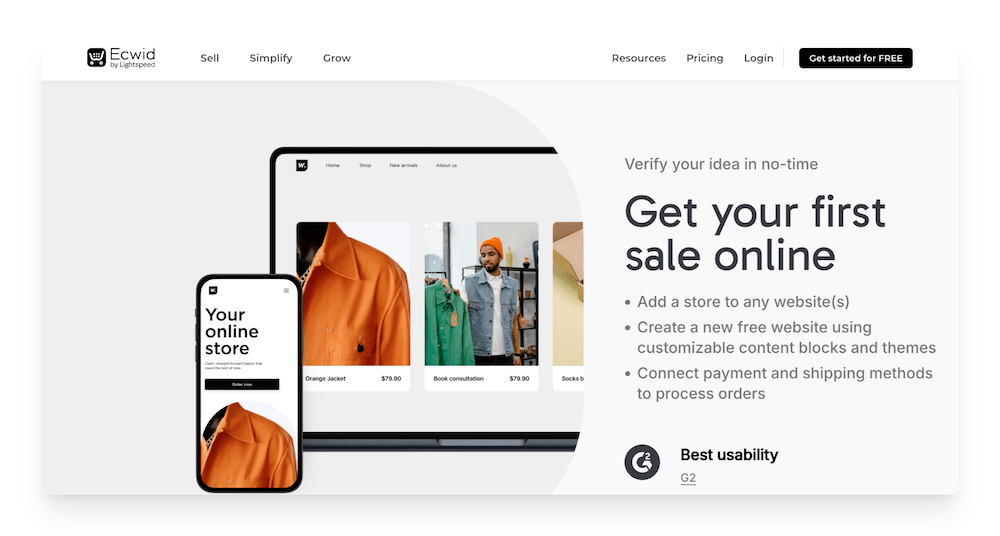
Flexible and easy to use, the Ecwid ecommerce platform is designed to integrate seamlessly with existing websites, social media, and marketplaces. Perfect for small to medium-sized businesses, it allows merchants to add an online store to their digital presence without starting from scratch.
- Seamless integration
Ecwid excels at integrating with existing websites and platforms. Whether you have a WordPress blog, a social media page, or a marketplace store, Ecwid can embed a fully functional online store, eliminating the need to build a new website from the ground up.
- Multi-channel selling
With Ecwid, you can sell across various platforms, including Facebook, Instagram, Amazon, and eBay, from a single dashboard. This centralized management simplifies operations and helps you reach a broader audience with minimal effort.
- Low-cost plan for beginners
Ecwid offers a $5 Starter plan, a great choice for small businesses or individuals new to the online selling game. This plan includes essential features like selling up to five products, more than 70 design templates, email support, and more, allowing you to establish an online presence at little cost.
Ecwid pricing: Starting at $5 per month
| Pros 🌟 | Cons 🚧 |
|---|---|
| 🔗 Easy integration with existing websites, social media, and marketplaces | ⚙️ Not as feature-rich for larger businesses or high-volume sellers |
| 📱 Responsive designs and a mobile app for store management | 🧑💻 Customization options can be limited without technical knowledge |
| 🌎 Multiple languages and currencies for international selling | 📈 Features like abandoned cart recovery and advanced analytics require higher-tier plans |
| 💰 Low-cost option available for beginners with basic ecommerce needs | - |
Choosing your online sales platform
How do you choose the right solution to build your site and create your brand?
Before embarking on an ecommerce journey, future entrepreneurs often ask themselves the same questions about their future business. To help you choose the best ecommerce solution for your future market, let’s take a look at how to clear up the first preliminary points before making a strategic choice.
To help you get started, here’s a list of questions to guide your choice:
- Who are the customers in your target audience?
- Is the platform suited to your level of technical expertise?
- What are the platform’s native features (SEO, analytics, ecommerce, content management)?
- Will you have to add functionality via paid plugins or extensions?
- Does the solution offer tools or options to optimize your site’s SEO?
- Is the price/performance ratio satisfactory for your needs?
- What level of support does the platform offer (customer support, tutorials, forums)?
- What security features are offered (SSL certificate, piracy protection, backups)?
- Does the platform comply with data protection standards (GDPR, etc.)?
- Is the site adapted to different devices (responsive design)?
- Does the solution offer integrated hosting, or do you need to find a separate host?
- How easy is it to maintain the site (updates, bug fixes)?
- Are there any case studies or testimonials demonstrating user satisfaction?
How big is your product catalog?
First of all, what products would you like to sell? Are you a designer of small, inexpensive items? Are you a retailer of large, high-end products? Would you like to showcase your services through an online sales site tailored to your unique business? Do you have a physical store that you’d like to digitalize through ecommerce?
The size of your product catalog will determine the specific needs you’ll have in setting up your online store. Precise details, color variations, product options and so on. You’ll need to analyze the levers you’ll need to set up your sales site properly in advance, in order to respect both your products and your customer’s shopping experience.
Before committing yourself to a particular solution, take a look at your competitors, take the time to analyze your stock of products, and make projections over both the short and long term to understand the challenges that await you on your ecommerce site and, consequently, to choose the best ecommerce platform for your business.
What is the budget needed to create an online store?
To get started in ecommerce, you don’t need to plan on spending hundreds of thousands of dollars from the outset. It all depends on the type of ecommerce solution you choose: with the WiziShop ecommerce solution, you can start your business for just $24.90 per month, while enjoying a 7-day free trial!
Then, depending on the basic budget you’re able to allocate to your online sales activity, you can either start by creating your own site and supporting this launch with free or low-cost marketing levers, or you can build up a more substantial marketing plan to invest in advertising, partnerships with influencers, finding partners who can support your activity in other sectors and with other targets, etc.
Thanks to automation and the tools available on the internet, many jobs can now be done automatically and at very reasonable prices.
So, before you think that your company will have to take on a certain salary burden, or that you’ll have to hire staff to relieve you of certain situations, don’t hesitate to browse the web to find the most economical and reliable options that can help you save time and money with a view towards long-term development.
What’s more, some subscription-based solutions (such as WiziShop) support the integration of modules and tools directly into the administration area of your online store, making it easier for you to manage your business.
What skills do you need to create your online sales site?
- Evaluating your technical skills
The level of your technical skills will guide your decision towards your ideal ecommerce solution. Web hosting, technical updates, plug-in integration, configuration of a complete dashboard in your back office, marketing integrations, addition of native payment methods, order processing and invoicing... If you’re not comfortable with all these functions and specific notions, then it’s best to opt for turnkey platforms with personalized support.
This is often what holds back aspiring entrepreneurs wishing to enter the online sales market. But fear not! Lack of knowledge of computer functions and tools is not an end in itself. The web abounds with services that enable as many people as possible to create their own tailor-made careers, especially in ecommerce!
When deciding on your future structure, take this aspect into account: are you qualified to take care of your entire site on your own, or would you like to be accompanied? Do you have any computer skills or none at all?
- Choosing between open source, headless, and SaaS
At this point, you can narrow down your choice between three types of models: open source, headless or SaaS.
If you opt for open source in ecommerce, this type of structure is free. It’s free, provided you know how to code, how to integrate add-on modules (sometimes at a cost), and you know programming languages inside out.
If you don’t, you’ll have to go to an agency specializing in open-source configuration, which will charge you hundreds or even thousands of dollars for each stage in the development of your structure. This can quickly add up.
What’s more, if you urgently need to fix a bug or add a new feature, you’ll be dependent on your agency’s schedule, and they certainly won’t be able to unblock your situation quickly or free of charge.
And if you’re looking for even greater flexibility, while freeing yourself from technical constraints, that’s where headless ecommerce platforms come into play. These solutions are distinguished by their special architecture, where the back end (content management) is separated from the front end (visual presentation). In concrete terms, this means you have total freedom to develop the user interface you want, while relying on a solid system to manage your content.
The main advantage of headless ecommerce platforms is their ability to integrate easily with a multitude of tools and services. You’re no longer limited by the constraints of a preconceived theme or interface; everything is customizable to your needs, whether you want to develop your ecommerce business on a site, a mobile app, or any other digital medium.
However, this freedom comes at a cost: technical expertise. A headless ecommerce platform requires a team capable of managing APIs, developing customized interfaces, and ensuring optimal integration between the various components of your ecosystem.
Alternatively, you can turn to a SaaS solution and all its advantages: the use of this type of platform is based on cloud computing. With SaaS, you control your business from A to Z. SEO, choice of domain name, inventory management, customized design...
The structures of this mode integrate all the functionalities required for the smooth running of your basic online store, directly into the chosen subscription, and adapt to your needs as your project progresses. Most often based on a monthly subscription, software of this type can be accessed directly via the internet, whenever and wherever.
All your data is securely stored on remote servers, so you can work from anywhere at any time. What’s more, it’s a proven fact that data security is much stronger with this mode than with open source, when you have to store your data yourself. To make sure your ecommerce site runs smoothly, dedicated site maintenance teams are at your service to ensure you always get the best out of your online store.
With a SaaS solution like WiziShop, you’ll never be alone with your ecommerce project and business: it’s not just a website you’ll be building, but an adventure supported by a team at your service to help you through every stage of your retail adventure
What’s more, with its built-in artificial intelligence, you won’t have to worry about writing content and optimizing texts: the AI takes care of everything! Whether it’s finding content ideas, writing blog posts, creating paragraphs, or reformulating texts on your site, everything is integrated into your administration space. No need for technical knowledge of ecommerce writing: WiziShop saves you time and money!
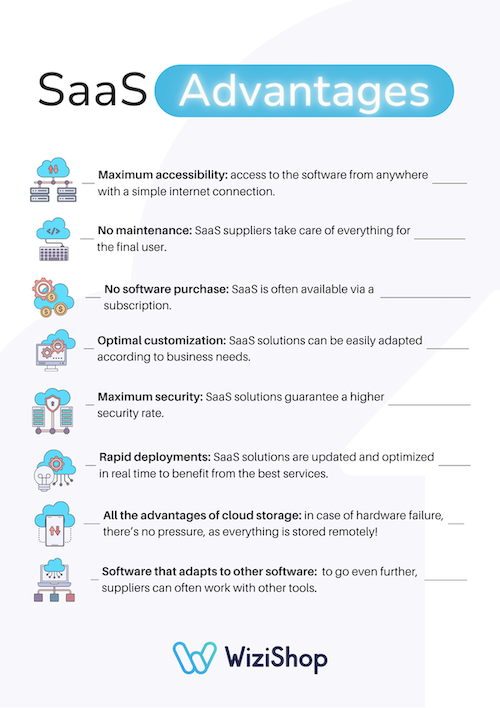
Try WiziShop free for 7 days
THE EASIEST NO-CODE ECOMMERCE SOLUTION✅ No credit card required
✅ Access to all features
✅ No commitment
FAQ: Ecommerce platforms
Before understanding which services are suitable for your ecommerce needs, let’s first see what the main characteristics of ecommerce structures are so that you can have all the elements necessary for the best choice of your future tool.
What are ecommerce platforms?
Ecommerce platforms are sales tools to allow future sellers to run their activity through a site and an interface dedicated to ecommerce. The chosen ecommerce platform will then allow the e-merchant to offer its products and services to its future potential buyers through one or more websites configured for ecommerce.
Several types of ecommerce platforms respond in their own way to the wishes of e-retailers according to their specific needs, the themes of each, according to the customization necessary for the proper functioning of ecommerce businesses.
Whether through self-configured software or turnkey support, the ecommerce platform is programmed to provide ecommerce professionals with all the features necessary for the merchant to publish their products, enter in contact with their future potential buyers, and generate sales with the help of essential tools such as online payment, delivery services, the establishment of detailed product pages, etc.
Unlike showcase site platforms, ecommerce platforms specialize in launching online stores by offering all the elements necessary for ecommerce success.
Which ecommerce platform is best?
If you are about to launch your own online store, it’s important to choose the ecommerce solution that suits you best. This may seem daunting, but don’t worry: we’re here to help!
Determine your business needs. Once you have a clear idea of your needs, you can start exploring the different ecommerce platforms available. Note that there are easy-to-use ecommerce platforms, such as WiziShop.
It’s essential to consider the cost of the ecommerce solution to make the right choice for your business. Some platforms may be inexpensive, while others may cost several hundred dollars per month. You’ll need to consider the long-term cost and do a thorough comparison to ensure you choose the solution that gives you the best value for money.
Also identify the quality of customer support. Problems can arise at any time, so it’s crucial to know that you can count on a knowledgeable support team to help you resolve them quickly. Also make sure that the chosen ecommerce solution offers comprehensive documentation and easy-to-understand user guides.
What are the different types of things a good ecommerce solution will have?
- A fluid, responsive interface
To successfully complete all your ambitious online store projects, it’s best to use an ecommerce platform that gives you access to all your data and information through a simplified interface and fluid navigation, particularly in your back office.
Your days and your schedule will be full, so save your energy and time for your main activities: your products on your online store and marketing to make your brand known, with the aim of generating ever more sales. SEO, graphic themes, or content creation: these are all crucial components of ecommerce!
- Customizable design templates
Your ecommerce business also depends on your image on the web. So any top-notch ecommerce platform should offer you every possible solution to make your online store your official showcase, incorporating all the aesthetic codes, themes, and graphic guidelines that reflect you, without compromise. When it comes to online stores, customization is king!
Your brand is unique, and so is your site: the ecommerce structure that accompanies your business must respect the quality of your proposals.
- An inventory and catalog system
An ecommerce platform should be totally dedicated to your business. As such, a good platform is going to enable you to manage your inventory and product catalog with the greatest of ease.
Product page, items, services, delivery, shipping, terms and conditions, return policy... These elements represent the core of your business, the most important content: your solution should adapt to your needs in terms of implementation, management, and changes of all kinds, to format your online store in the best possible way through a comprehensive back office.
- Online payment services
Ecommerce CMSs must also provide you with all the tools you need to ensure the smooth running of your purchasing funnel and the user experience you’re going to offer your potential customers. And for many of them, this means providing payment methods and features that are practical and accessible to all!
Consumers like to be able to choose the payment options that are best suited to them when placing an order. Whether this involves credit cards, Apple Pay, PayPal, or other methods, your ecommerce platform must be able to adapt to your customers’ requirements to maximize your chances of conversion.
- Trust signals and enhanced data security
Your data is the most important part of your ecommerce business. Your ecommerce solution needs to prioritize security and be able to protect your data as well as that of your future customers.
A lack of clarity or a certain vagueness around personal information is a source of problems in ecommerce. Make sure that the platform you choose covers all the details and features that will reassure customers, while keeping your data and database secure and confidential.
- Customized, personalized customer service
Because the ecommerce adventure can be a long and winding road, you don’t want to be left alone with your doubts and questions. Your ecommerce platform is there to help you make your entrepreneurial journey a smooth one.
And because your business is like no other, being able to turn to an advisor, learning about your sector, and relying on resources available at any time will be essential arguments for making your online sales business flourish over time, with targets that are always evolving.


![12 Best ecommerce platforms for creating your online store [2026 list]](https://wizishop.com/media/6784e884c4f6b1663f352bb2/v1/ecommerce-platforms-wizishop.jpg)







